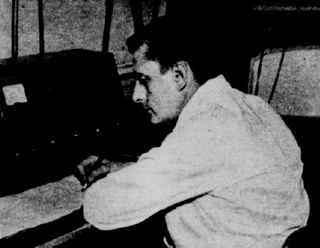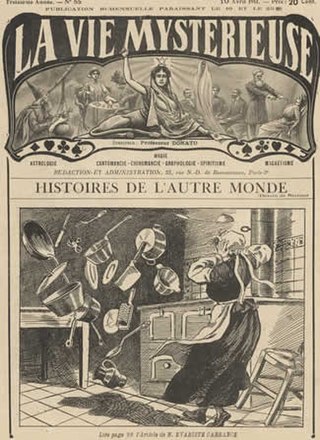
Clairvoyance is the claimed psychic ability to gain information about an object, person, location, or physical event through extrasensory perception. Any person who is claimed to have such ability is said to be a clairvoyant.
Extrasensory perception (ESP) also known as the sixth sense, is a paranormal ability about receiving information not gained through the recognized physical senses, but sensed with the mind. It is claimed to be more sophisticated than intuition and the knowledge obtained is usually received from dreams, astral projection, or psychic abilities.

Parapsychology is the study of alleged psychic phenomena and other paranormal claims, for example, those related to near-death experiences, synchronicity, apparitional experiences, etc. Criticized as being a pseudoscience, the majority of mainstream scientists reject it. Parapsychology has also been criticised by mainstream critics for claims by many of its practitioners that their studies are plausible despite a lack of convincing evidence after more than a century of research for the existence of any psychic phenomena.

Telepathy is the purported vicarious transmission of information from one person's mind to another's without using any known human sensory channels or physical interaction. The term was first coined in 1882 by the classical scholar Frederic W. H. Myers, a founder of the Society for Psychical Research (SPR), and has remained more popular than the earlier expression thought-transference.

A psychic is a person who claims to use extrasensory perception (ESP) to identify information hidden from the normal senses, particularly involving telepathy or clairvoyance, or who performs acts that are apparently inexplicable by natural laws, such as psychokinesis or teleportation. Although many people believe in psychic abilities, the scientific consensus is that there is no proof of the existence of such powers, and describes the practice as pseudoscience. The word "psychic" is also used as an adjective to describe such abilities.
Remote viewing (RV) is the practice of seeking impressions about a distant or unseen subject, purportedly sensing with the mind. Typically a remote viewer is expected to give information about an object, event, person or location that is hidden from physical view and separated at some distance. Physicists Russell Targ and Harold Puthoff, parapsychology researchers at Stanford Research Institute (SRI), are generally credited with coining the term "remote viewing" to distinguish it from the closely related concept of clairvoyance. According to Targ, the term was first suggested by Ingo Swann in December 1971 during an experiment at the American Society for Psychical Research in New York City.
In American science fiction of the 1950s and '60s, psionics was a proposed discipline that applied principles of engineering to the study of paranormal or psychic phenomena, such as extrasensory perception, telepathy and psychokinesis. The term is a blend word of psi and the -onics from electronics. The word "psionics" began as, and always remained, a term of art within the science fiction community and—despite the promotional efforts of editor John W. Campbell, Jr—it never achieved general currency, even among academic parapsychologists. In the years after the term was coined in 1951, it became increasingly evident that no scientific evidence supports the existence of "psionic" abilities.

Helmut Schmidt was a German-born physicist and parapsychologist whose experiments on extrasensory perception were widely criticized for machine bias, methodological errors and lack of replication. Critics also noted that necessary precautions were not taken to rule out the possibility of fraud.
Dean Radin investigates phenomena in parapsychology. Following a bachelor and master's degree in electrical engineering and a PhD in educational psychology Radin worked at Bell Labs, as a researcher at Princeton University and the University of Edinburgh, and was a faculty member at University of Nevada, Las Vegas. He then became Chief Scientist at the Institute of Noetic Sciences (IONS) in Petaluma, California, USA, later becoming the president of the Parapsychological Association. He is also co-editor-in-chief of the journal Explore: The Journal of Science and Healing. Radin's ideas and work have been criticized by scientists and philosophers skeptical of paranormal claims. The review of Radin's first book, The Conscious Universe, that appeared in Nature charged that Radin ignored the known hoaxes in the field, made statistical errors and ignored plausible non-paranormal explanations for parapsychological data.

Joseph Banks Rhine, usually known as J. B. Rhine, was an American botanist who founded parapsychology as a branch of psychology, founding the parapsychology lab at Duke University, the Journal of Parapsychology, the Foundation for Research on the Nature of Man, and the Parapsychological Association. Rhine wrote the books Extrasensory Perception and Parapsychology: Frontier Science of the Mind.

Stanley Krippner is an American psychologist and parapsychologist. He received a B.S. degree from the University of Wisconsin–Madison in 1954 and M.A. (1957) and Ph.D. (1961) degrees from Northwestern University.
Loyd Auerback is a parapsychologist, paranormal investigator, and mentalist. He has appeared on numerous television shows that profile ghost hunting and other paranormal topics. He develops and teaches online courses on parapsychology.
John Gerald Taylor was a British physicist and author. He is notable for writing a book critical of paranormal phenomena.
Douglas Scott Rogo was a writer, journalist and researcher on subjects related to parapsychology. Rogo was murdered in 1990 at the age of 40. His case remains unsolved.
The Journal of Parapsychology is a biannual peer-reviewed academic journal covering research on psi phenomena, including telepathy, clairvoyance, precognition, and psychokinesis, as well as human consciousness in general and anomalous experiences.
In psychology, anomalistic psychology is the study of human behaviour and experience connected with what is often called the paranormal, with few assumptions made about the validity of the reported phenomena.

Gardner Murphy was an American psychologist who specialized in social and personality psychology and parapsychology. His career highlights include serving as president of the American Psychological Association and the British Society for Psychical Research.

Telekinesis is a hypothetical psychic ability allowing an individual to influence a physical system without physical interaction. Experiments to prove the existence of telekinesis have historically been criticized for lack of proper controls and repeatability. There is no reliable evidence that telekinesis is a real phenomenon, and the topic is generally regarded as pseudoscience.

Charles Edward Mark Hansel was a British psychologist most notable for his criticism of parapsychological studies.









